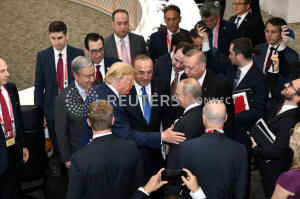G20 stops short of denouncing protectionism, warns of global slowdown
 Send a link to a friend
Send a link to a friend
 [June 29, 2019] By
Leika Kihara [June 29, 2019] By
Leika Kihara
OSAKA (Reuters) - Leaders of the Group of
20 major economies warned on Saturday of growing risks to the global
economy but stopped short of denouncing protectionism, calling instead
for a free, fair trade environment after talks some members described as
difficult.
In a communique at the end of a two-day meeting in Japan's western city
of Osaka, the leaders said global growth remained low and risks were
tilted to the downside, as trade and geopolitical tensions have grown.
"We strive to realise a free, fair, nondiscriminatory, transparent,
predictable and stable trade and investment environment, and to keep our
markets open," they said in a second successive summit statement that
refrained from urging the need to resist protectionism.

Japanese Prime Minister Shinzo Abe put on a brave face, stressing the
G20 leaders had much in common, such as a shared recognition of the need
for the group to remain key drivers of global growth.
"The G20 agreed on fundamental principles backing a free trade system,"
Abe said, adding that the group had also pledged stronger action to
improve the dispute settlement system of the World Trade Organization
(WTO).
In preparing the G20 statement, Japan, the chair of the meetings, has
sought common ground between the United States, which opposes language
denouncing protectionism, and other nations seeking a stronger warning
against trade tension.
"There were no breakthrough decisions but ... all participants have
confirmed their aspiration to work further on improving the global trade
system, including the aspiration to work on WTO reform," Russian
President Vladimir Putin told a news conference on Saturday.
"The fact that all have confirmed the need of this process and their
readiness to work toward this process is already positive."
[to top of second column] |

President Donald Trump talks with Russian President Vladimir Putin
during the closing session of G20 leaders summit in Osaka, Japan,
June 29, 2019. G20 Osaka Summit Photo/Handout via Reuters

RESUMING TALKS INSUFFICIENT
Widening fallout from the U.S.-China trade war has jolted markets and tested the
resolve of G20 members to present a united front in averting a global recession.
The United States and China agreed to restart trade talks, offering some hope
that the world's two largest economies can resolve the bitter dispute.
The European Union and South American bloc Mercosur agreed a free trade treaty
on Friday, committing to more open markets in defiance of the rising tide of
protectionism.
"This deal promotes our values and supports a multilateral, rules-based system,"
European Commission President Jean-Claude Juncker told reporters on Saturday,
taking a swipe at U.S. President Donald Trump's aversion to multilateralism.
However, Christine Lagarde, managing director of the International Monetary
Fund, warned the global economy had hit a "rough patch" due to the trade
conflicts, and urged G20 policymakers to reduce tariffs and other trade
obstacles.
"While the resumption of trade talks between the United States and China is
welcome, tariffs already implemented are holding back the global economy, and
unresolved issues carry a great deal of uncertainty about the future," she said
in a statement.
Last year's G20 summit in Buenos Aires was the first to drop the language on the
need to denounce protectionism, deferring to a request by Washington, which is
sensitive to criticism of the tariffs it is slapping on some G20 members.
(Additional reporting by Katya Golubkova; Editing by Tom Brown and Clarence
Fernandez)
[© 2019 Thomson Reuters. All rights
reserved.] Copyright 2019 Reuters. All rights reserved. This material may not be published,
broadcast, rewritten or redistributed.
Thompson Reuters is solely responsible for this content. |